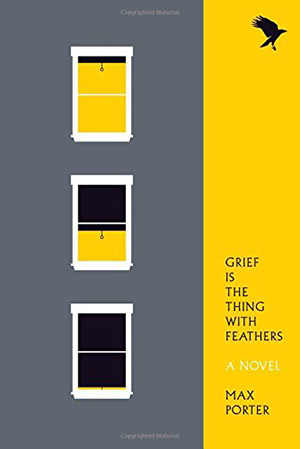[alert variation=”alert-info”]Publisher: Graywolf Press
Formats: Paperback, eBook, Kindle
Purchase: Powell’s | Amazon | IndieBound | iBooks[/alert]
All of us deal with grief in different ways and in this short book Max Porter presents us with grief in the form of a crow. It is not a mystery why the crow is the perfect symbol of grief. Crows are oftentimes associated with bad luck or evil omens, which is appropriate for this book in which the Mum dies from a strange accident. Crows are also birds of carrion, which swoop down and eat the remains of decaying animals, but crows are also known for their intelligence and resilience, so what better animal to use than this bird to personify grief.
When the book begins the character that is simply called “Dad,” is wandering around in his flat only five days after his wife has died. At this point all of the mourners have departed and the children are asleep and the doorbell rings. When he answers, Dad is accosted by feathers and describes his strange experience, “There was a rich smell of decay, and moss, and leather, and yeast.” A crow appears and tells Dad, “I won’t leave until you don’t need me anymore.”
The rest of this short book alternates between Dad, Crow, and the Children narrating the story. The Crow is there to ease the grief for Dad and the children, but he also gives advice, babysits, and entertains. When Crow speaks the story takes on a poetic tone. When he enters the home he notices that “The whole place was heaving mourning, every surface dead Mum, every crayon, tractor, coat, welly, covered in a film of grief.” Crow notices that there is not an inch of the home that is unaffected by the Mum’s sudden death.
I love that the author includes the point-of-view of the children since grief affects them very differently than adults. The children, who are two small boys, and whom the author simply calls “Boys,” say that they first can’t get a straight answer about where Mum is. It is natural that adults want to protect children from misfortune but Dad can only keep the truth from the Boys for so long. Children oftentimes understand serious things more than we give them credit. They say about the Mum’s death: “We guessed and understood that this was a new life and Dad was a different type of Dad now and we were different boys, brave new boys without a mum.” Throughout the book the boys are not only brave, but are also astute at analyzing their feelings as well as their Dad’s.
There are some truly exceptional, short passages that beautifully capture the grief of Dad who loved his wife dearly and was very close to her. For example, the Dad gets very upset when he starts to forget every day, mundane things about his wife. So to assuage his grief he tells the boys what a wonderful Mum they had. The Boys grieve for the Mum in their own unique ways. One of my favorite passages written from the point-of-view of the boys is when they describe how they used to be scolded for spattering the mirror with toothpaste, leaving the toilet seat up and for not shutting drawers. The Boys now do these things because they miss their Mum and doing these same things now reminds them of her.
This short, powerful book poetically describes the gaping hole that the absence of a loved one leaves in our life. We are all affected by grief in different ways, and we all have that crow that hangs around us as a reminder of what we have lost. But in the end everything does get a little better and a little easier and the crow eventually flies away.
[signoff predefined=”Social Media Reminder” icon=”facebook”][/signoff]

